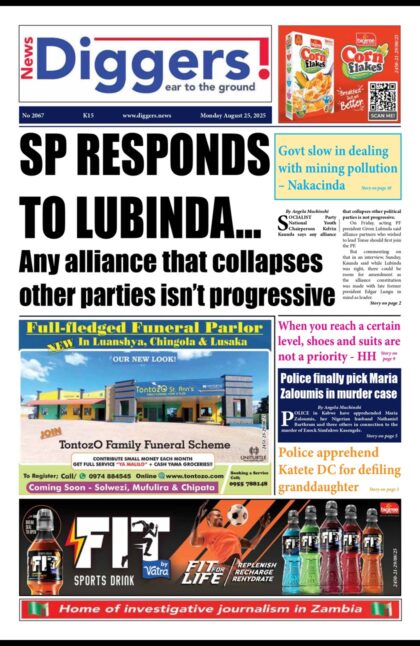POLICE Spokesperson Rae Hamoonga says President Hakainde Hichilema has not issued any instructions for police to arrest any member of the opposition.
PF recently alleged that President Hichilema had ordered the jailing of Zambia’s key political figures on espionage charges after they featured in a documentary denouncing the SADC Electoral Observer Mission report which accused Dr Nevers Mumba of undermining elections in Zimbabwe.
This was after police summoned PF faction vice-president Given Lubinda, secretary general Raphael Nakacinda, information and publicity chairperson Emmanuel Mwamba and Socialist Party leader Dr Fred M’membe.
But in an interview, Sunday, Hamoonga said President Hichilema was not the reason the opposition leaders were summoned.
“Since when did the President start instructing the police to arrest someone? When did the president ever instruct the police to arrest someone? What they should understand is this, if someone commits an offence, the police have a duty to arrest. It’s not like the President has instructed, no. If you commit a crime, we have to arrest you. When someone is summoned to the police, we don’t start discussing why that person has been summoned. So, when they come, we discuss and once we are done, we announce to the public. I don’t know what they have been summoned for, but we will comment when we are done with the investigations,” Hamoonga said.
Hamoonga said if investigations concluded that they committed espionage, then they would be charged accordingly.
“If that’s what they breached, yes, we shall use it. If that is the offence they committed, we shall arrest them based on those facts. If you kill somebody, you will be arrested for that. We will use section 200 of the Penal Code. If you commit an offence, it’s according to our laws in this country, those laws were not written by the President, and they have been there before. So, if you breach any of them, we will arrest you in relation to the offence you have committed,” Hamoonga said.
“You don’t decide who should be arrested as police, no, it’s your actions which determines, or which warrant us to summon you and act. You are made to account for your actions. So, people should not be blaming anybody. You commit an offence on your own then you start pointing fingers at someone. It’s your own conduct that gets you arrested”.
And commenting on the Zambia Conference of Catholic Bishops’ pastoral letter, in which the bishops observed that police were not letting the opposition enjoy their rights to assemble, Hamoonga said whoever felt aggrieved by police decisions should challenge them before the courts of law.
“[As] police, we are law enforcers, if there’s anybody who has any complaints regarding the way we enforce the law, that’s why the courts of law are there. You cannot make a judgment in your own mind, go to the courts of law, challenge our actions and then the courts will make a decision. You don’t just stand on an anthill and start shouting, no. You go to the courts of law and they are going to make a decision. Because anybody can make a decision based on what suits them. So you cannot just stand up and start making wild allegations. The courts are competent enough to adjudicate over these matters, they will make a ruling. I don’t think the courts are closed in Zambia, they are still open,” said Hamoonga.























